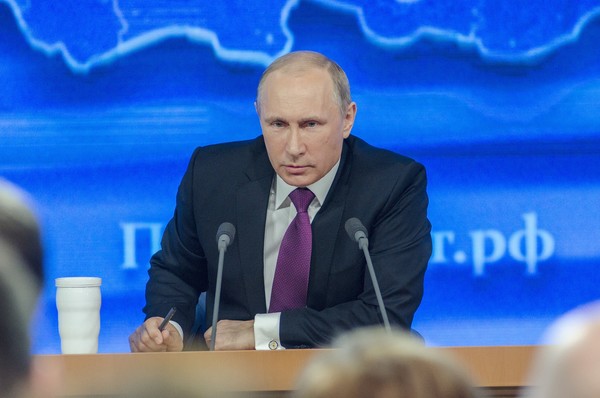One Year into the Russia-Ukraine War:
More than a year has passed since the commencement of war in Ukraine, with no clear victory in the foreseeable future. Meanwhile, millions have been displaced from their homes, spurring a massive humanitarian crisis. In this Spotlight, we review the development of the war from our view 13 months in and its implications in both a humanitarian and political context.
The Russia-Ukraine war, unlike its inception as a “special military operation”, has quickly evolved into the largest conflict in Europe since the World Wars. It has had widespread consequences around the globe, spurring a massive humanitarian crisis while also causing economic repercussions. As neither side backs down, many more innocents will likely be sacrificed before any conclusion can be drawn.

Yet, war is not merely an issue concerning human casualties. It is also a massive political event, one likely to determine the standing of involved parties for years to come. Since the beginning of the war, countries have been forced to choose sides, causing shifts in political alliances. Even the United Nations has taken a stance, with Secretary-General Antonio Guterres restating his “full commitment” towards Ukraine in his visit to Kyiv on March 8. Meanwhile, multiple northern and eastern European countries are seeking NATO membership, including those countries bordering Russia such as Ukraine and Finland. Though Ukraine is yet to be a member, Ukrainian President Volodymyr Zelenskyy has stated that Ukraine and NATO are “de facto allies”, with NATO supporting the transfer of “humanitarian and non-lethal aid” to Ukraine and allies of NATO providing Ukraine with military aid worth billions of euros.
NATO expansion is not without controversy, however, with President Vladimir Putin citing it as a reason for Russia’s invasion. Previously, ex-President Mikhail Gorbachev had also condemned it as a “violation of the spirit of the statements and assurances” that were made in 1990. NATO is a security alliance that was established during the Cold War to counter the expansion of the USSR. Russia views the US-led alliance as anti-Russian, while their activities including the positioning of weaponry in member states have been perceived as potential security threats. Ukraine’s NATO membership would bring the purported “anti-Russian” front right up to Russia’s borders. Nevertheless, Kyiv and its allies were quick to criticize when French President Emmanuel Macron addressed the issue of Ukraine’s NATO membership, remarking that Russia must be given security guarantees during negotiations. President Zelenskyy's top aide Mykhailo Podolyak has stated that it was the world that needed security guarantees against Russia, while former Soviet nations have also expressed the same concern.
Though anti-Russian sentiment has become widespread across the globe, some countries are yet to openly condemn Russia. China has repeatedly expressed support for Ukraine’s sovereignty and Russia’s security, drawing criticism for placing both aggressor and victim on the same level. Without showing outright support for either side, China has retained its “no-limits” partnership with Russia throughout the war, providing rhetorical support for Russia by placing blame for the conflict on US involvement. Recently, after being accused of providing weapons to Russia, China countered with criticism of the West’s continued military support for Ukraine, stating that “sending weapons will not bring peace” in the UN General Assembly last February. China will find it hard to help Russia directly for fear that the economic sanctions hurting Russia will also fall on China’s faltering economy. Thus, Russia might not find assistance in the form of weapons or advanced technology used in their production. On the other hand, US officials state that China is still considering sending weapons to Russia, while a recent POLITICO report claims that Chinese companies have sent Russia equipment with possible military uses such as drone parts, though they may not have been used in fighting the war. It remains to be seen what role China might assume as the war continues, potentially aggravating the conflict or bringing countries to the negotiating table. On the one-year mark of the war, Beijing issued a 12-point peace plan calling for peace talks, where China would play a “constructive role”. The plan drew criticism for being skewed towards Russia, but displayed China’s wish to play a central role on the international stage. In that case, China’s influence on Russia might help bring forward negotiations between the warring states.
Completely cementing itself as a pariah, Russia has had to deal with an unparalleled number of sanctions, including export sanctions that have deprived Russia of Western-produced technology and energy sanctions that are targeting Russia’s biggest export. The EU has imposed embargoes and price caps on Russian energy, forcing Russia to sell its products at lower prices and immediately weakening the ruble. Though this led to a spike in energy prices, it has helped reduce the EU's dependency on Russian energy. These sanctions are likely to impact the country’s economy, contributing to public resentment that might deter Russia from continuing its war efforts. Still, it will take more than sanctions to topple both the Russian economy and the Russian public’s support for the war. Within Russia, the war against Ukraine is understood as the “denazification” of Ukraine and its rightful return to its home nation. Thus, while Russia has become unpopular internationally, Putin’s approval ratings have remained high within Russia, which have only dropped once since the start of the war after partial mobilization was announced. However, the rise in the number of Russians leaving Russia and continued acts of protest against the war might paint a different picture.
The outcome of the war remains unclear. Russia has the upper hand on the map, having seized 11% of Ukrainian territory. But the widespread, vocal support for Ukraine has made Russia’s position precarious: it has gotten itself stuck in a war bogged down with moral outrage and having provoked the rest of the world. Losing its geopolitical leverage in the form of energy supply while feeling the impact of sanctions, President Putin will soon find himself in a political conundrum.

